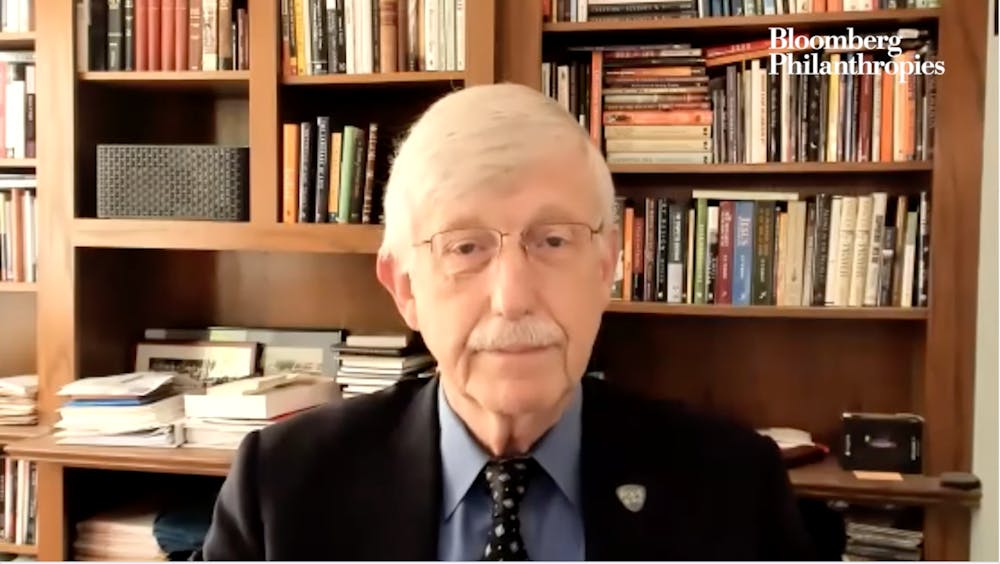As part of Bloomberg Philanthropies’ efforts concerning public health awareness and the fight against the COVID-19 crisis, Dr. Kelly Henning, the current head of Bloomberg Philanthropies Public Health, interviewed Dr. Francis Collins, the current director of the National Institutes of Health in Bethesda, Md. and a global leader on gene discourse and discovery.
Their discussion, titled “The Enduring Pandemic: COVID-19, What We Know Now and Where We Go From Here,” covered the main topics of the pandemic and the questions that people could have, ranging from the effectiveness of booster shots to the effects of long COVID-19.
Above all, Collins stressed the importance of vaccination as key toward stopping the pandemic and returning to a relative degree of normalcy.
Booster shots
The meeting between Collins and Henning took place as the Centers for Disease Control and Prevention Advisory Committee on Immunization Practices was discussing the pros and cons of approving booster shots for the general populace.
Collins mentioned Israel, a country whose rapid vaccination efforts have led to data suggesting that the efficacy of certain vaccines begins to wane over time. According to Collins, the current boosters look impressive, representing up to 10 to 12-fold increased protection against the virus. Boosters have already been approved for those above 65 years of age and younger if there exist comorbidities and occupational risks within the hypothetical receiver.
Collins explained that above all, more information is needed regarding these boosters as well the progression of the pandemic before a real decision can be made regarding their use, either annually or as a one-time shot.
COVID-19 variants
The seemingly endless array of COVID-19 variants and their associated dangers are concerning to experts in the field. It is not an unfounded worry — the Delta variant has been found to be over two times more contagious than previous variants.
On this topic, Collins took a more sobering stance, detailing the need for surveillance and vigilance across the world to keep track of when new variants appear.
“We are only four to five mutations away from a variant that would evade our vaccines,” Collins said.
Although some variants of interest other than Delta have come to light, such as the Mu variant in Latin America, Collins explained vaccination is important in making sure these variants do not gain a foothold.
Long COVID-19
Long COVID-19 can be seen as one of the worrisome effects of the virus, mainly due to its ability to impair mental faculties and render what used to be second nature impossible. Collins specifically remarks on COVID-19’s troubling and surprising nature due to the irregularity of its existence when compared to other respiratory diseases of this nature, from which one gets sick but eventually makes a complete recovery.
In addition, long-term effects are felt even in mild cases of COVID-19, after which symptoms of brain fog and muscle fatigue can extend for months past the presence of the virus in the body.
Studies concerning long COVID-19 are still in relative infancy, but Collins pointed to two main theories concerning its origin.
The first is chronic infection: Is the virus persisting, leaving permanent or long-lasting damage on the organs and tissues of the human body? Collins doesn’t put too much stock in this theory due to evidence that the virus has left our body when the symptoms are occurring but cannot deny the possibility of a reservoir existing somewhere within the body.
The second theory is immune system overreaction: Is our immune system stuck in the state of trying to deal with the virus, unable to reset itself back to its normal rhythm? According to Collins, increasing evidence supports this hypothesis.
Vaccine hesitancy
For some, vaccine hesitancy may not have come as much of a surprise. For Collins, it was an unanticipated hurdle that belies the seriousness of the virus. He pointed out that many people refuse to take vaccines despite the fact that there are different vaccines to choose from, many significantly more effective than what scientists thought they would be at the start of the pandemic.
It was hoped that the full approval of the Pfizer vaccine by the Food and Drug Administration would assuage fears concerning their safety, but it appears that those who refuse do so for reasons that may stem from the barrages of misinformation that plague social media.
Children’s vaccines
The topic of a COVID-19 vaccination for children has been up for debate since the beginning of the pandemic, for both political and scientific reasons. Collins has reason to believe that progress is being made and expressed optimism about the results of a recent trial done by Moderna, which gave 5 to 11-years-olds a third of a dose. In addition, Pfizer has announced that its COVID-19 vaccine has been shown to be effective in small doses for those within the aforementioned five-to-11 age group.
For those under five years of age, trials by various vaccine manufacturers are underway; the results of those trials can be expected later this year. While we wait, Collins stressed the importance of masks, not only in school zones containing unvaccinated children but in everyday life, to help prevent the spread of the pandemic both indoors and outdoors.





